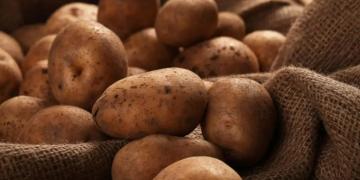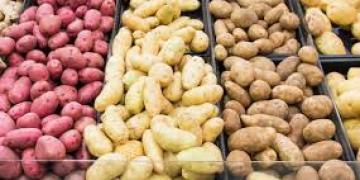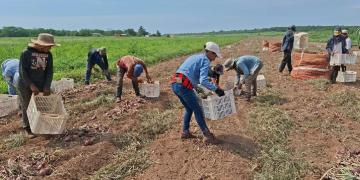Gran Bretaña: Wet March and April showers ’likely to impact’ potato herbicide plans
Potato growers are facing a different proposition when it comes to weed control this spring following delayed planting of much of the UK’s maincrop, according to Corteva Agriscience.

A wet March saw planters unable to travel and seed stocks stuck in sheds while almost 120mm of rain fell, representing 80% more rain than is typical for the month, Met Office data shows.
South west and south east England were the worst-affected regions, while growers in the north west and north east were spared some of the rain but battled more frosts and snow.
While planting is now well underway, Corteva says maincrop potatoes are likely to have been drilled later than planned.
And, where April showers have continued, residual herbicide programmes may not have been applied in a timely manner, if at all.
The bulk of the weed control workload in potatoes is carried out using residual chemistry applied to ridges shortly after planting.
Weeds evading the scope of residuals are tackled with a post-emergence spray, typically in May.
Craig Chisholm, Corteva’s field technical manager for potatoes, said there were three main reasons why weed control was important in potatoes.
"The first is protecting the crop from yield-robbing competitive weeds, and the second is ensuring harvest machinery is not hampered or slowed down," he explained.
“But perhaps the most important reason to keep weeds in check is to reduce the risk of blight through sheltering leaves or contributing to a more favourable microclimate.”
Growers unable to get their pre-emergence herbicides on should instead use a post-emergence approach as the crop encounters warming, moist conditions.
Titus is a sulfonylurea herbicide containing rimsulfuron for control of broad-leaved weeds in potatoes, Mr Chisholm said.
Applied in mixture with metribuzin, it provides the most comprehensive post-emergence weed spectrum.
“Titus is most effective against small, actively-growing weeds, and should be applied before the crop provides a sheltering canopy, which may compromise activity,” he added.
“Titus is safe across all varieties, but should not be applied to seed crops, and users should check that their variety is listed as tolerant of metribuzin before including in the mix.”
The selective herbicide has been a mainstay for potato growers for almost three decades, with a weed spectrum that includes cleavers, chickweed, redshank, mayweed and oilseed rape volunteers.
Titus has also demonstrated excellent activity on some grasses, notably couch.
Fuente: https://www.farminguk.com/news/wet-march-and-april-showers-likely-to-impact-potato-herbicide-plans_62423.html




